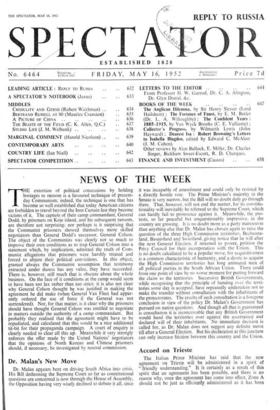NEWS OF THE WEEK
THE extortion of political concessions by holding hostages to ransom is a favoured technique of present- day Communism; indeed, the technique is one that has become so well established that today American citizens are forbidden to travel beyond the Iron Curtain lest they become victims of it. The capture of their camp commandant, General Dodd, by prisoners on Koje island, and his subsequent ransom, are therefore not surprising; nor perhaps is it surprising that the Communist prisoners showed themselves more skilled negotiators than General Dodd's successor, General Colson. The object of the Communists was clearly not so much to improve their own conditions as to trap General Colson into a statement which, by implication, admitted the truth of Com- munist allegations that prisoners were harshly treated and forced to abjure their political convictions. In this object, granted always the Communist assumption that testimony extracted under duress has any value, they have succeeded. There is, however, still much that is obscure about the whole business. On the face of it conditions at the camp would seem to have been too lax rather than too strict; it is also not clear why General Colson thought he was justified in making the agreement he did make (when General Van Fleet had appar- ently ordered the use of force if the General was not surrendered). Nor, for that matter, is it clear why the prisoners should have thought General Colson was entitled to negotiate in matters outside the authority of a camp commandant. But probably they realised that the agreement might have to be repudiated, and calculated that this would be a nice additional tit-bit for their propaganda campaign. A court of enquiry is clearly needed to clear all this up. Meanwhile it very strongly enforces the offer made by the United Nations' negotiators that the opinions of North Korean and Chinese prisoners should, if necessary, be investigated by neutral commission.


































